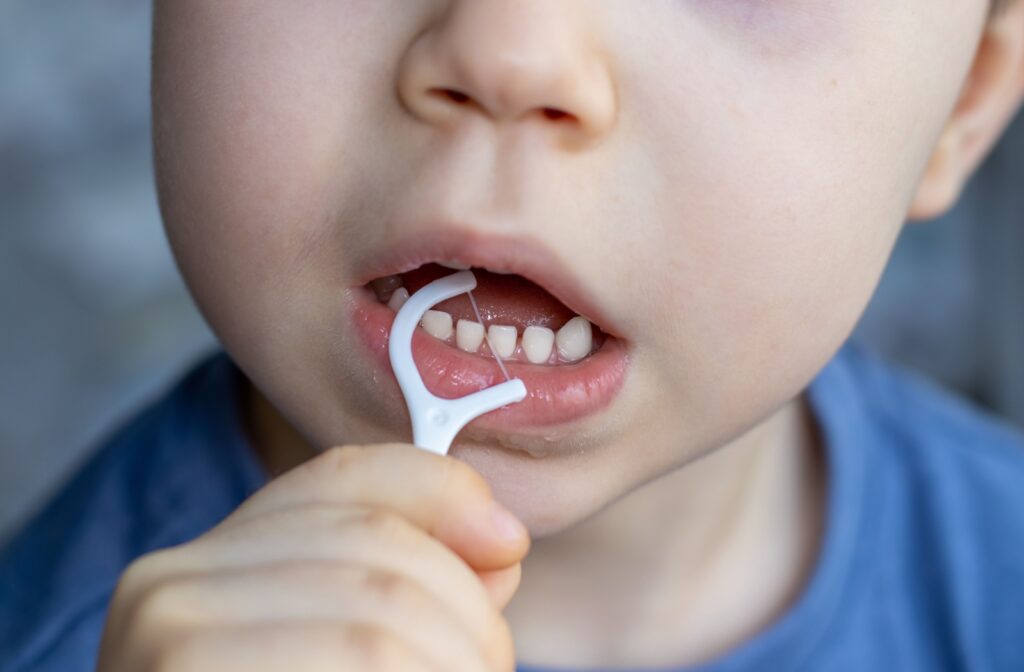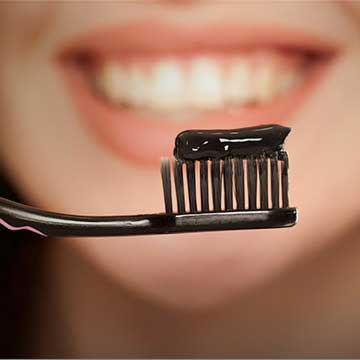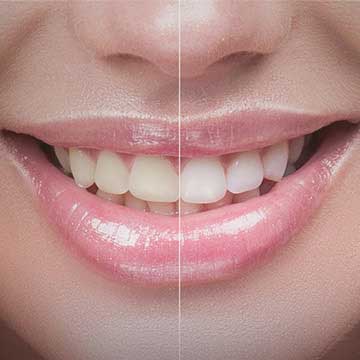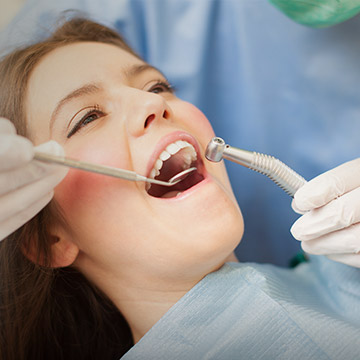Most people grow up learning to brush their teeth twice daily and floss at least once to care for their dental health. However, flossing often gets skipped. Many people forgo flossing because they find their gums are sensitive, they bleed, or they’re too busy or tired to take the extra time to floss. Sometimes, neglecting flossing can cause dental anxiety before dental exams.
Some people ditch the floss because they fear flossing will create gaps in their teeth. If you’ve just started flossing again, it may feel like there are gaps between your teeth. However, this is because plaque buildup and food particles are removed from your teeth.
Why Does Flossing Appear to Cause Gaps?
Flossing does not create gaps. It reveals the natural spacing between your teeth by removing debris.
Plaque, tartar, and food particle buildup can give the illusion that your teeth are closer together than they are. Once you start flossing and removing these substances, your teeth may have more space between them. This cleaning can sometimes make the spaces between your teeth look more pronounced, but it is a sign that your oral health is improving.
If you haven’t flossed regularly, your gums might be swollen or inflamed. When you start flossing, the inflammation decreases, causing the gums to shrink to their normal size. This can make it seem like gaps are forming, but your gums are simply returning to a healthier state.
What Can Cause Gaps in Your Teeth?
Although flossing is likely not to blame for gaps in your teeth, some conditions can cause gaps between your teeth. Common causes include:
- Natural Tooth Alignment. Genetics play a significant role in determining the size and shape of teeth and the overall structure of the jaw. Gaps may naturally occur if teeth are smaller or jaws are larger.
- Gum Disease. Gum disease can destroy the supporting structures of your teeth, causing them to shift or become loose. As the gums recede, spaces can appear between teeth, contributing to the appearance of gaps.
- Tooth Loss. Loss of a tooth, whether due to decay, injury, or periodontal disease, can create empty spaces that disturb the alignment of surrounding teeth. This shift can form gaps as other teeth drift into the vacant space over time.
- Orthodontic Factors. There may be a period immediately following the removal of braces during which teeth can shift. The teeth might misalign again if retainers aren’t worn as prescribed, leading to gaps.
- Habits and Lifestyle. Certain habits, such as thumb-sucking and excessive teeth grinding, can impact the positioning of your teeth, potentially creating gaps. Addressing these issues early on is crucial to maintaining proper alignment.
Maintaining regular dental check-ups and discussing any concerns with your dentist can help manage and mitigate the causes of gaps in your teeth.
Why Is Flossing Important for Oral Hygiene?
Dental floss can reach the areas your toothbrush can’t, like the tight spaces between your teeth and under the gumline. If you don’t clean your teeth properly or forgo flossing entirely, these areas become breeding grounds for bacteria and plaque.
Regular, consistent flossing can help prevent:
- Cavities, which damage your tooth’s protective coating and cause holes to develop.
- Gum disease, which starts with plaque buildup along the gumline. If not removed, plaque hardens into tartar, leading to gingivitis and, eventually, periodontitis.
- Bad breath or halitosis, which often results from trapped food particles and bacteria in your mouth.
How to Floss Correctly
Starting to floss again after forgoing it for a long time can seem daunting. However, knowing the right way to floss can increase efficacy and minimize discomfort.
- Use about 18 inches of floss and wind most of it around one of your middle fingers, with the rest around the opposite middle finger.
- Hold the floss tightly between your thumbs and forefingers.
- Gently slide it between your teeth using a gentle up and down motion.
- Curve the floss into a C shape against each tooth and gently slide it under the gumline.
Floss at least once daily in the morning or before bed to maintain optimal oral health. While many experts say that the best time to floss is before brushing your teeth at night (to remove all food particles and plaque before you sleep), the best time is the time that allows you to floss consistently every day.
Choosing the Right Floss
Various types of dental floss are available, including waxed, unwaxed, flavoured, and tape floss. Choose one that suits your needs and feels comfortable to use. If the spaces between your teeth are tight, a thinner, waxed floss might work better.
Common Flossing Mistakes and How to Avoid Them
- Inconsistent flossing can lead to plaque buildup and gum disease. To maintain healthy teeth and gums, make flossing a daily routine.
- Flossing too aggressively can damage your gums and cause bleeding. Be gentle and take your time to avoid injuring your gums.
If you experience persistent bleeding, consult your dentist, as it could be a sign of gum disease.
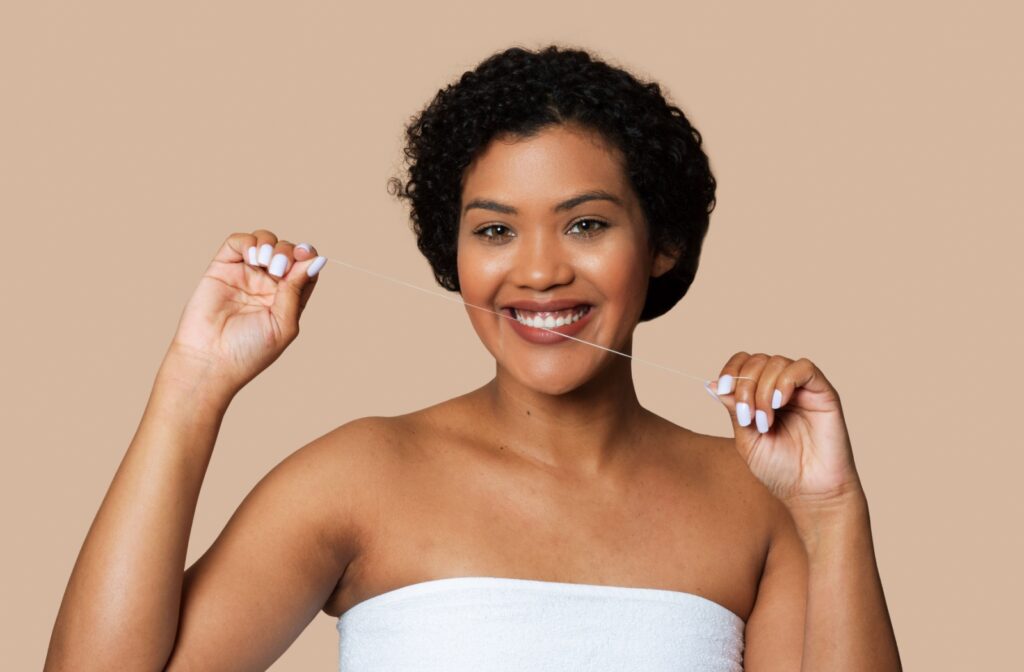
Is Over-Flossing Possible? Does It Cause Loose Teeth?
While it’s essential to floss daily, over-flossing is rare but possible. Be careful to hug against the tooth and avoid using a sawing motion back and forth over your gums. The floss is supposed to clean the space between your gums and teeth.
Flossing correctly should not cause your teeth to become loose. If you experience loose teeth, it could be due to an underlying issue such as gum disease, not your flossing habits. Consult your dentist for a thorough examination.
What If I Don’t Like Flossing?
Some patients prefer to use a water flosser instead of using string floss. Used properly, it can replace string floss. Check out Dr. Sherry’s Waterpik® tutorial.
Routine Dental Visits Are Important, Too
In addition to brushing and flossing, professional cleanings are essential parts of dental care. Tartar can’t be removed by brushing or flossing. Regular cleanings can help prevent tartar buildup. Additionally, dental exams help monitor your oral health, detecting and addressing any underlying issues.
Otara Dental understands that flossing is sometimes forgotten and can make dental visits more stressful. Our team is trained to help reduce stress for all dental services. Contact us today to see what personalized dental care and flossing tips we can provide you.


